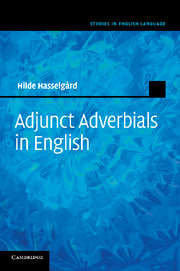Book contents
- Frontmatter
- Contents
- List of Figures
- List of Abbreviations
- Preface
- Part I A framework for analysing adverbials
- 1 Studying adjunct adverbials
- 2 The classification of adverbials
- 3 Some syntactic features of adverbial placement
- Part II Adverbial positions: theme, cohesion and information dynamics
- Part III Semantic types of adverbials: subtypes, frequencies and usage
- Part IV Adjunct adverbials in English
- Appendix
- References
- Index
1 - Studying adjunct adverbials
Published online by Cambridge University Press: 03 May 2010
- Frontmatter
- Contents
- List of Figures
- List of Abbreviations
- Preface
- Part I A framework for analysing adverbials
- 1 Studying adjunct adverbials
- 2 The classification of adverbials
- 3 Some syntactic features of adverbial placement
- Part II Adverbial positions: theme, cohesion and information dynamics
- Part III Semantic types of adverbials: subtypes, frequencies and usage
- Part IV Adjunct adverbials in English
- Appendix
- References
- Index
Summary
Introduction
Adverbials may be regarded as a rag-bag category in the linguistic system. They tend to be negatively defined as elements that are not verbs and that do not have a participant function in the clause. In terms of a positive definition, adverbials are often said to provide the answers to questions such as how, where, when, why? (e.g. Crystal 2008: 14). In some ways how, where, when and why adverbials appear to be prototypical, and they are often given as examples in brief definitions of adverbials such as the one in Crystal (2008) or the following from Sinclair et al. (1990: 281): ‘An adjunct is a word or a group of words which you add to a clause when you want to say something about the circumstances of an event or situation, for example when it occurs, how it occurs, how much it occurs, or where it occurs.’ Some idea of the frequency of adverbials can be had from the following example, in which the adverbials have been highlighted using italics and with added underlining if an adverbial occurs inside another.
(1) Radio was, and still is, good to me. As an actor, I had appeared in innumerable schools broadcasts, in Saturday Night Theatre and in The Dales. For seven years I had been broadcasting regularly on Monday morning from the archives. I had been made a ‘regular’ by Brian Cook, who later became Controller of Radio City in Liverpool. Of all my broadcasting, the Monday morning spot was perhaps the best fun. Not only was there the pleasure of listening to old recordings and the great names of the past, but there was an opportunity to write almost anything one liked.
[…]
- Type
- Chapter
- Information
- Adjunct Adverbials in English , pp. 3 - 13Publisher: Cambridge University PressPrint publication year: 2010



